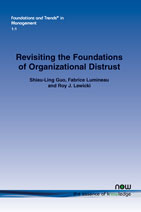Revisiting the Foundations of Organizational Distrust
By Shiau-Ling Guo, Purdue University, USA | Fabrice Lumineau, Purdue University, USA, Lumineau@purdue.edu | Roy J. Lewicki, The Ohio State University, USA
Abstract
Parallel to the very large scholarly interest in trust, scholars in management and related disciplines have made the case for the importance of distrust as a related but distinct construct. This paper critically assesses current literature on distrust in organizational settings. We first take stock of the extant research on organizational distrust and suggest an integrative framework. Second, to underpin research on organizational distrust, we examine the different scholarly perspectives on the conceptual relationship between trust and distrust. In turn, we discuss key issues to position research on trust and distrust. Third, we highlight empirical evidence on the role of distrust as opposed to that of trust. We specifically discuss alternative approaches and implications about how distrust and trust can be empirically distinguished. Fourth, we make suggestions to integrate distrust research into relationship repair literature. Fifth, we summarize our review and point to specific areas for new theoretical and empirical research on distrust, particularly at the organizational level. Finally, we discuss specific empirical challenges in this growing literature. Based on our systematic discussion of the organizational distrust literature, we believe that we have opened up prospective avenues to advance distrust research in strategic management.
Revisiting the Foundations of Organizational Distrust
Revisiting the Foundations of Organizational Distrust systematically discuss the theoretical perspectives on the relationship between distrust and trust, highlights the potential research opportunities and challenges pertinent to distrust studies, and draws implications of distrust research for strategic management.
The literature on distrust has grown substantially since the beginning of the 1960s. One initial observation is that the extant research uses many different definitions and perspectives on distrust, and this diversity exacerbates the fragmentation of the literature. The variety of perspectives on distrust only re-emphasizes the necessity of gaining a better understanding of how distrust links to and distinguishes itself from trust before exploring the prospect and challenges of distrust research, particularly for scholars in strategic management. More specifically, it is crucial to draw attention to the novel insights that distrust studies may bring about for strategic management and organizational theory scholars.
The analysis is organized into six parts: (1) discussing extant research on distrust in organizational settings; (2) examining various theoretical perspectives on the relationship between trust and distrust; (3) illustrating the extant empirical evidence of the relationship between trust and distrust; (4) considering the potential role of distrust in relationship repair; (5) pointing out specific research avenues in strategy areas; and (6) highlighting empirical challenges of studying distrust in organizational settings. Based on an examination of existing research on distrust in organizational settings in the first section, the authors extend the discussion to various theoretical perspectives and empirical evidence of the relationship between trust and distrust in the following sections. The authors also suggest specific promising research opportunities and challenges of distrust studies in the last three sections. As distrust spans many different research areas, Revisiting the Foundations of Organizational Distrust should be of interest to scholars in management as well as in the sociology of organizations and organizational psychology.
